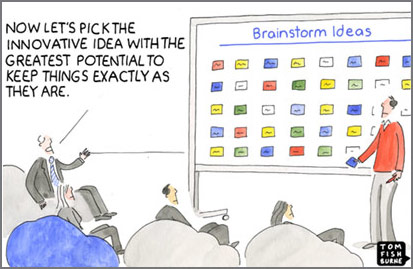Nottingham Spirk
A recent post at FastCompany.com, titled “These Three Phrases Are Killing Innovation at Your Workplace,” generated a lot of discussion in our office. The writer identified three seemingly innocent phrases — “best practices,” “return on investment” and “When I worked for …” — that can “send a message to employees that they shouldn’t spend time exploring new ideas, let alone bring them up to the team.”
We’ve been there. When we work with partner-clients, part of our mission is to show them our process, so that they can adapt it to their own organizations for future use. And our process starts with being open to a wide range of possibilities. “There are no bad ideas” is one of our most important mantras. Ideas are starting points for discussion, research and testing; throttling them immediately just limits your options, and — to Fast Company’s point — makes everyone more wary of stretching their imaginations.
Here are some we’ve heard over the years, from companies large and small.

©marketoonist.com
“No wild ideas.”
Every truly innovative product or technology was a “wild idea” at some point. Taming the discussion from the start serves no purpose other than ensuring that the destination will be very close to the starting point. (Related: “We don’t need…” How do you know what you need in the idea phase?)
“That looks too expensive.”
This sometimes comes up before we’ve even discussed, much less explored, the many — and constantly evolving — options for sourcing, materials and manufacturing. Commercialization should be part of the discussion from the earliest stages. (Related: “We aren’t set up to do that type of manufacturing.” Well, someone is.)
“The COGS [Core Objectives, Goals and Strategies] must be…”
We understand the urge to impose order on the inherently unpredictable creative process. But setting long-term objectives at the outset is like planning the page count, cover and promotional tour for a novel that you haven’t even started writing. You need a process that balances the realities of business with the uncertainty of creation, with neither overwhelming the other. (Related: “Let’s take a pause …” This is the delayed version, when the excitement of setting off in new directions is overtaken by fear of getting lost.)
“We tried that before.”
OK, what did you learn? And what new approaches — including options not available at the time — might help you overcome or avoid the obstacles you encountered? Maybe all you need is fresh eyes. (Related:
“That’s been done.”
Could it be done better? Smartphones existed long before Apple got in the game.)“It’s a good idea for camping.”
This one is an inside joke. A former partner-client was sometimes quick to pigeon-hole ideas and dismiss suggestions for new ventures outside their comfort zone. Some organizations are unnecessarily rigid in their views of their core competencies. (Related: “We’ve never tried anything like that before.” Maybe it’s time.)
Words reflect attitudes, attitudes shape culture, and in our experience, culture is the single most important indicator of an organization’s ability to innovate. If your culture is open to new ideas, and patient enough to pursue them, anything is possible.
About Nottingham Spirk
Nottingham Spirk is a business innovation and product design firm with an unrivaled record of delivering disruptive consumer goods, medical devices, and packaging design solutions to market. We collaborate with Fortune 1,000 companies, funded start-ups and non-profit organizations to discover, design and execute product programs and strategic business platforms that will delight customers, grow markets and generate new revenue streams. Learn more about our innovation approach.
Submit a comment